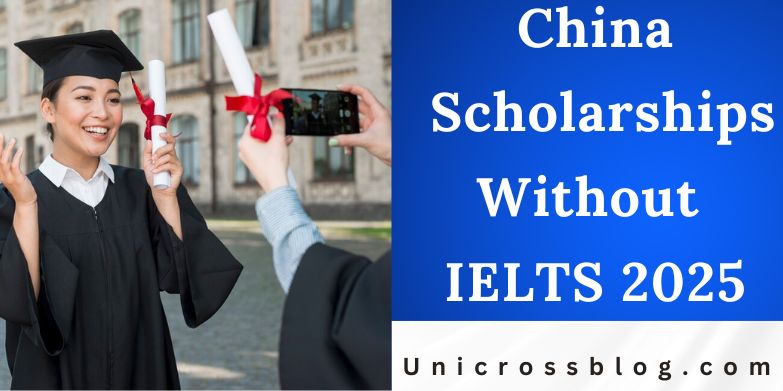Studying in China has become an increasingly attractive option for international students seeking high-quality education without the barriers of expensive language tests. For the 2025 academic year, numerous scholarships in China waive the IELTS requirement, making it easier for applicants from non-English speaking backgrounds to pursue their dreams. These opportunities are particularly welcoming if your previous education was conducted in English or if you can provide a simple proficiency certificate from your institution. China, with its blend of ancient heritage and cutting-edge innovation, hosts over 500,000 international students annually, offering programs in fields like engineering, business, environmental science, and the humanities. The country’s universities rank among the world’s best, and its scholarships emphasize cultural exchange, academic excellence, and global cooperation.
One of the biggest draws is the fully funded nature of many programs, which cover tuition, accommodation, stipends, and health insurance. This allows students to immerse themselves fully in their studies and experiences, from exploring the Great Wall to engaging in vibrant city life in Shanghai or Beijing. Without the need for IELTS, the application process focuses more on your academic record, research potential, and motivation. In 2025, the Chinese government and universities are expanding these initiatives to attract diverse talent, especially from Asia, Africa, and beyond. Whether you aim for a bachelor’s, master’s, or PhD, these scholarships open doors to transformative education in a nation investing heavily in international partnerships.

Why Choose China Scholarships Without IELTS in 2025?
China’s education system is renowned for its rigor and relevance to global challenges. Universities like Tsinghua and Peking offer state-of-the-art facilities and research opportunities that rival those in the West, often at a fraction of the cost. The absence of IELTS requirements stems from China’s flexible policies: if English was the medium of instruction in your prior studies, or if you submit a certificate from your school confirming proficiency, that’s sufficient for most programs. This policy recognizes that standardized tests aren’t the only measure of ability.
For 2025, scholarships align with China’s Belt and Road Initiative, prioritizing students from partner countries. Benefits extend beyond finances; recipients gain access to language courses, cultural activities, and networking events that foster lifelong connections. With enrollment numbers rising, China aims to educate future leaders who can bridge cultures and drive innovation. Programs span disciplines, ensuring options for nearly every interest. The application window typically runs from December 2024 to April 2025, giving ample time to prepare.
Key Scholarships Available in 2025
1. Chinese Government Scholarship (CSC Scholarship)
The flagship program, administered by the China Scholarship Council, supports over 280 universities for undergraduate, master’s, and PhD levels. Fully funded, it provides a monthly stipend of up to 3,500 Yuan (about 500 USD), free tuition, on-campus housing, and comprehensive medical insurance. No IELTS is needed if you prove English-medium education. Age limits are 25 for bachelor’s, 35 for master’s, and 40 for PhD applicants. Applications go through the CSC portal, with deadlines around February to March 2025. It’s ideal for those seeking broad exposure, as it covers fields from STEM to social sciences.
2. Shanghai Government Scholarship
Targeting international students at Shanghai’s top institutions like East China Normal University, this fully funded award covers tuition, accommodation, and a generous stipend. It supports bachelor’s, master’s, and PhD programs without IELTS, accepting an English proficiency letter instead. The scholarship promotes Shanghai’s role as a global hub, offering perks like internships in finance and tech. Apply directly through participating universities by April 2025; it’s especially suited for business and urban studies enthusiasts.
3. Nanjing University Scholarship
A fully funded gem for master’s and PhD candidates, this covers all costs including a monthly allowance. Hosted at one of China’s historic universities, it waives IELTS for applicants with prior English instruction. Programs emphasize research in sciences and humanities. The 2025 intake prioritizes innovative proposals; submit via the university portal by March.
4. Alliance of International Science Organizations (ANSO) Scholarship
Focused on master’s and PhD in science and technology, ANSO is fully funded and IELTS-free, covering flights, visas, tuition, and stipends. Partnered with the Chinese Academy of Sciences, it’s perfect for researchers from developing countries. Applications open in early 2025, emphasizing collaborative projects on global issues like climate change.
5. Yunnan Provincial Government Scholarship
For students from South and Southeast Asia, this covers degree and non-degree programs at Yunnan University of Finance and Economics. Fully funded without IELTS, it includes tuition waivers and living expenses. It highlights regional studies and economics, with a welcoming environment for cultural immersion. Deadline: February 2025.
6. Siemens China Scholarship
Exclusive to PhD students at Tsinghua University, this fully funds engineering and tech research. No IELTS required; focus on your academic portfolio. It supports innovative work in automation and sustainability, with mentorship from industry leaders. Apply by January 2025.
These scholarships represent just a selection; many universities offer similar waivers, ensuring accessibility for diverse applicants.
Eligibility Criteria
To qualify, you must be a non-Chinese citizen in good health, not holding another Chinese scholarship. Academic requirements vary: a high school diploma for bachelor’s, bachelor’s for master’s, and master’s for PhD. Strong GPAs, recommendation letters, and study plans boost chances. No criminal record is essential, and some programs require pre-admission from a host university.
Benefits and Coverage
Most are fully funded, eliminating financial worries. Expect tuition exemptions, dormitories or subsidies, stipends (2,500 to 3,500 Yuan monthly), and insurance covering major illnesses. Additional perks include one-way airfare for some and free Chinese language training.
READ ALSO: Middle East Scholarships for International Students 2025/2026
FAQs
Can I apply for multiple scholarships at once?
Yes, but you cannot hold more than one government-funded award simultaneously. Declare all applications in your forms.
What if my previous education wasn’t in English?
Some programs offer preparatory language courses. Submit any available proficiency proof, like TOEFL alternatives, or opt for Chinese-taught tracks with HSK certification.
Are family members covered under these scholarships?
No, benefits are for the student only. Spouses or children must apply separately or self-fund.
How competitive are these scholarships?
Highly, with thousands applying. Stand out with unique research ideas and extracurriculars.
What happens if I get accepted but cannot travel?
Deferrals are rare; contact the university immediately for options like visa extensions.
Do these scholarships include work opportunities?
Part-time campus jobs are allowed up to 20 hours weekly, but prioritize studies.







